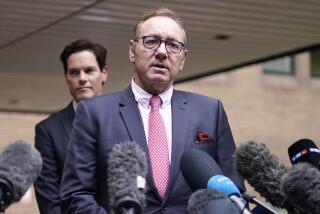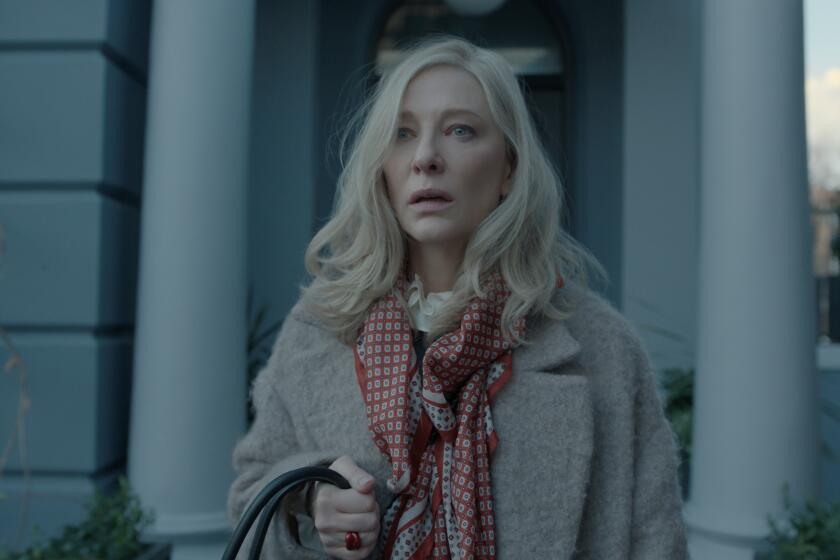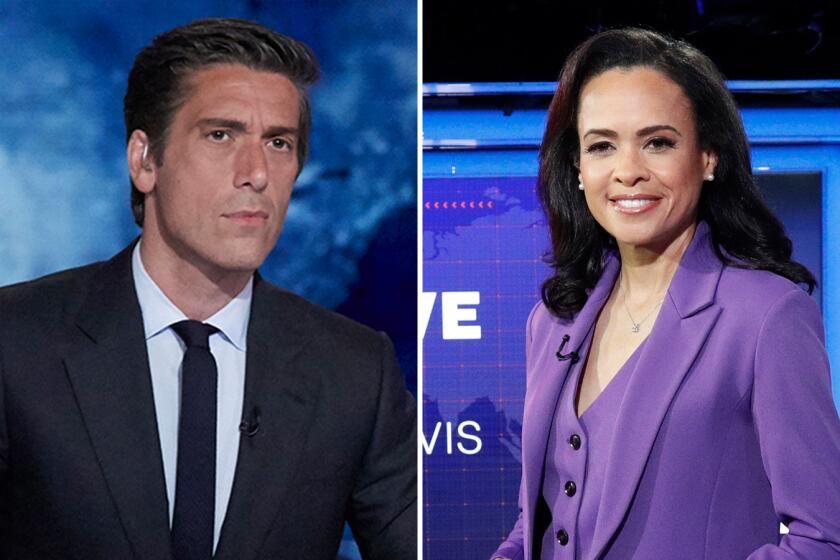Critic’s Notebook: Enter action hero, Liam Neeson
I don’t know exactly when Liam Neeson turned into Hollywood’s favorite vengeance machine — the go-to guy for settling scores — but he has definitely arrived with an emotionally gripping performance in the current box-office hit “The Grey.” Surely “Taken” in 2009 , with his ex-CIA operative in a relentless and ruthless bid to find his kidnapped daughter, signaled that he had made the A-team. And in 2010, he would actually join a re-imagined “A-Team” as its tactical leader, Hannibal, with all the historic resonance that name implies.
But it took the snarling nip and the stone-cold thrill of “The Grey,” with Neeson’s loner taking on the wilds, the wolves and to some extent God, to solidify that the actor has become the power player of payback. Despite a few dissenters on that ill-fated plane downed in the Alaskan outback, it’s clear from the sheer will that radiates through the sharp-shooter Ottway’s every move that he is the one who will get you out alive if anyone can.
It feels like its own sweet revenge that at nearly 60 Neeson defines if not outright owns a genre usually dominated by younger men and their oft-displayed, well-toned abs. He exudes the intrinsic appeal of a man of substance — ripened by age, tempered by intelligence, unwavering in his righteousness. In an unexpected way, you could make a case that he is a man for our times. Whether intentionally or by default, the roles the actor has taken speak to the country’s collective frustrations now as well as that deep lingering need for someone we can count on to make things right (see the themes coursing through the political debate from either side if you are looking for validation).
PHOTOS: Liam Neeson’s career in pictures
He didn’t start out to be an actor at all, studying math and science in college. But soon he was cutting his teeth on stage, first in Belfast, then at Dublin’s Abbey Theatre. With that Irish brogue, substantial size and sensitive face, early on he looked to be cut out for costume dramas. When director John Boorman saw him play Lennie in a production of “Of Mice and Men” in 1980, he cast him in 1981’s “Excalibur” as Sir Gawain, and a sir he has stayed.
Neeson has certainly done his share of period pieces since. Nearly always as a decent man beset by darker forces, he had a remarkable run that cemented him as a leading man with the love-and-loyalty torn New England farmer of “Ethan Frome” in ‘93, the 1700s Scottish highlander of “Rob Roy” in ‘95, the Irish firebrand “Michael Collins” in ‘96, a classic Valjean in “Les Misérables” in ’98 and his Oscar-nominated portrayal of the understated World War II heroics of Oskar Schindler in Steven Spielberg’s”Schindler’s List” in 1993.
At the most fundamental level, Neeson’s guys in distress have always tended to operate from a higher moral ground than most. But at some point along the way, the anger and resistance that permeated his roles turned into revenge of the take-no-prisoners, bloody-and-brutal-when-necessary sort. Like much about Neeson, even that revenge theme has roots in the ‘90s. Consider the first time the actor carried a film on those substantial shoulders, playing Peyton Westlake, the badly scarred scientist bent on restitution in director Sam Raimi’s 1990 cult hit, “Darkman,” tracking down those responsible for his disfigurement.
PHOTOS: Liam Neeson’s career in pictures
Through it all, Neeson has brought his distinctive style to the messes he’s sent in to clean up. Here’s what he is not: not a Kurt Russell, blue-collar, heartland type racing on the blacktop in “Breakdown” or blasting out in “Escape From New York.” Neither does he have the lovable lugishness of Mark Wahlberg in, say, “Contraband,” nor the not-as-lovable lugishness of Sylvester Stallone of the “Rambo” era. He comes with none of the crazed intensity of Tom Cruise-styled “Mission Impossible” or the cold mechanized distance of Arnold Schwarzenegger’s “Terminator,” although Neeson is nearly always a man apart.
Closer perhaps to the more refined, slightly restrained sensibility that Harrison Ford brought to agent Jack Ryan in his “Patriot Games” run, but not exactly. What then does define the quintessential Neeson style and why is it so relatable, so right for right now? There are a few central ingredients to his appeal.
He’s a slow-burn actor with a subtle mind that you can literally see sorting through his character’s options on screen. There’s a classic Neeson moment in “Taken”: time is running out, the chances he will find his daughter are diminishing, yet he methodically explains both motivation and method to the bad guy whose private parts he is wiring to the nearest electrical system. It is a tone so deliberate, so lethally charged, so frighteningly sane, that it leaves you dreading, accepting and most importantly forgiving the final flip of the switch that is coming.
The combination of that tone and his 6-foot-4 frame makes him the force to be reckoned with. He is impossible to miss in a scene, towering head and shoulders above any man, woman or beast he’s up against. But it is the strength and solidness of character that is implicit in the way Neeson exists within those moments; whether he’s unblinking in the face of a gun or backing down a wolf pack’s alpha male, he telegraphs an inner core that is fearless.
Those eyes, Paul Newman icy blue and set deep in his face, have always seemed deeply sad as well, with a haunting quality even on those rare occasions they are crinkled by a smile. Unspoken is that the portrait he’s painting — whether his prosecuted poor man in “Les Misérables,” the captain of a bound-for-disaster Russian nuclear sub in “K-19: The Widowmaker,” or the groundbreaking scientist of sexual behavior in “Kinsey” — is of someone who has been tested in ways you wouldn’t want to be.
There is also a noble father figure to be found within the no-nonsense pragmatism that usually drives his performances. A lean-on-me quality that can be heartwarming as when he played stepfather to a young boy in “Love Actually” or reassuring as the country doctor looking out for the isolated backwoods girl in “Nell.” Lurking in the background is also a father’s wrath, the sword-wielding warrior father of “Kingdom of Heaven” to be sure, but one he crystallized in “Taken.”
I don’t know how long Neeson will hold on to the vengeance crown — I hope for a bit longer. Maybe there will be interesting villains to come his way. Whether by choice or circumstance, truly bad guys are something he rarely traffics in — even his evil Henri Ducard in 2005’s”Batman Begins”was a villain played with satiric undertones.
But when filmmakers start musing about what Neeson might do next, when his revenge run is over, might I suggest romance? Though the actor occasionally shows up with a significant other, the relationships tend to be exceedingly fraught — a life emotionally and physically crippled by love in “Ethan Frome,” the husband suspected of cheating in 2009’s “Chloe,”the husband who suspects his wife of cheating in 2008’s “The Other Man,” to name a few. Comedy, on the other hand, has played in his career almost not at all, though a YouTube clip of his turn on Ricky Gervais’ new show with the actor playing himself pitching his desire to do improv showed a sense of comic timing and self-awareness that is as funny and as winning as watching him dispatch evil-doers.
Still, all the qualities that serve Neeson so well going up against evil big and small make him an ideal candidate for the relationship wars. Maybe it’s not too late to pencil in lover as well as fighter on that resume. Culturally, cinematically, I think we’re ready for it.
PHOTOS: Liam Neeson’s career in pictures
More to Read
The biggest entertainment stories
Get our big stories about Hollywood, film, television, music, arts, culture and more right in your inbox as soon as they publish.
You may occasionally receive promotional content from the Los Angeles Times.











